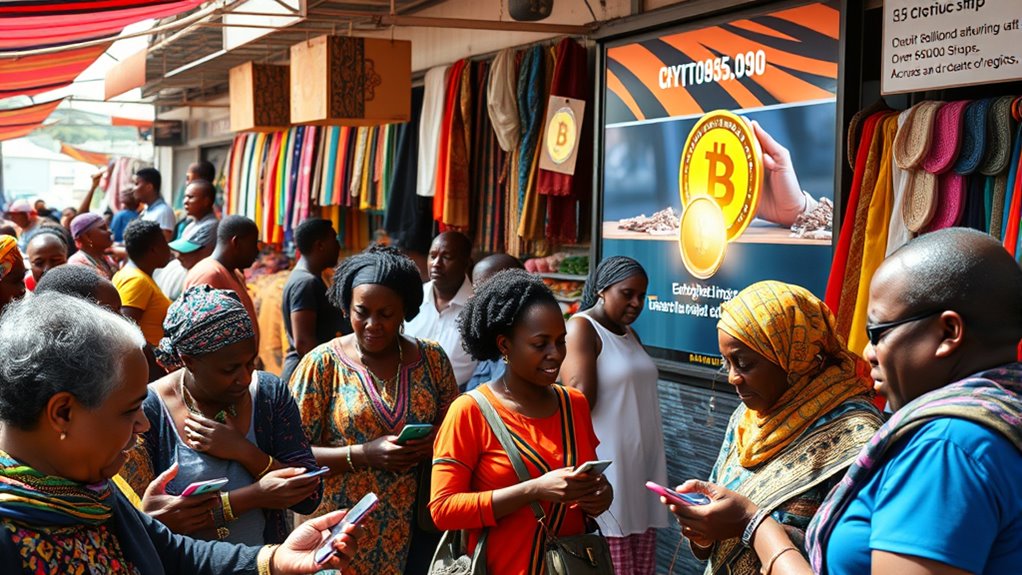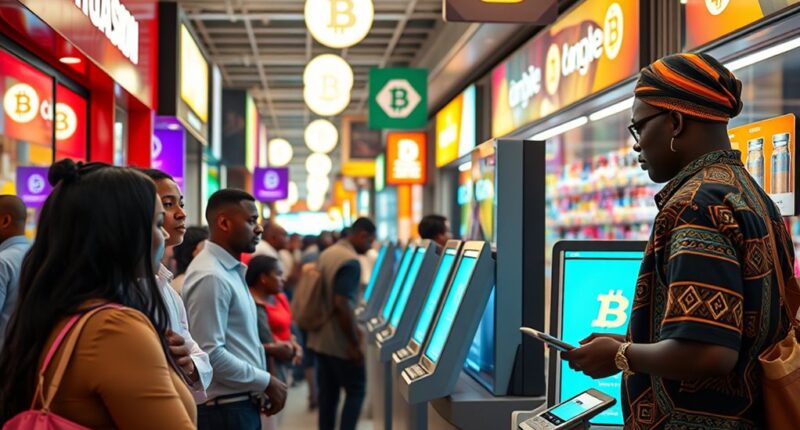South Africans are increasingly embracing cryptocurrency, with over 650,000 shops now accepting digital assets as payment. This shift highlights growing trust and the widespread adoption of crypto in everyday transactions. Clear regulations and improved infrastructure are making it simpler and safer to use digital currencies. As more businesses join, you’ll see how crypto is becoming a practical, mainstream option for consumers. To explore how this transformation is unfolding, keep exploring these developments further.
Key Takeaways
- Over 650,000 South African shops now accept cryptocurrencies, reflecting rapid mainstream adoption.
- Regulatory efforts by the government enhance trust and secure crypto transactions for merchants and consumers.
- User-friendly payment infrastructure simplifies crypto use, encouraging more businesses to integrate digital currencies.
- Increased acceptance improves consumer experience, offering more flexible, private, and secure payment options.
- South Africa’s expanding crypto ecosystem positions it as a significant player in global digital currency markets.

South Africans are increasingly embracing cryptocurrency, with over 650,000 shops now accepting crypto payments. This rapid adoption highlights a significant shift in how consumers and businesses view digital currencies. As more shops integrate crypto into their payment systems, you might wonder how this trend is shaping the country’s financial landscape, especially considering the evolving landscape of cryptocurrency regulations and digital payment infrastructure. The government’s approach to cryptocurrency regulations plays a *pivotal* role in fostering trust and stability, ensuring that both merchants and consumers feel secure when transacting with digital assets. While South Africa has taken steps to regulate the crypto space, these measures aim to prevent illicit activities while supporting innovation. Clearer regulations help you feel confident that your transactions are protected and compliant with local laws, which is essential for mainstream acceptance.
South Africa’s crypto regulations foster trust, supporting mainstream acceptance and secure digital transactions.
Simultaneously, the development of a robust digital payment infrastructure underpins this widespread acceptance. You’ll notice that shops accepting crypto often leverage user-friendly point-of-sale systems, making it easier for you to pay with digital currencies seamlessly. These innovations reduce the friction that once limited crypto use to niche markets, transforming it into a practical payment method for everyday purchases. The combination of supportive regulations and a solid digital payment infrastructure creates an environment where you can transact swiftly and securely, whether buying groceries, dining out, or shopping online. This infrastructure also encourages new business models, such as crypto cashback incentives and loyalty programs, further embedding digital currencies into daily life.
Moreover, the growing acceptance of cryptocurrency at tens of thousands of shops encourages more people to explore digital assets. You no longer need to be a tech expert to use crypto, as user-friendly apps and payment terminals simplify the process. With more merchants accepting crypto, you gain increased flexibility and privacy in transactions, especially when compared to traditional banking methods. South Africa’s focus on building a reliable and regulated crypto environment signals a future where digital currencies could become mainstream. You can expect ongoing improvements in how payments are processed, with new developments aimed at enhancing security, reducing transaction costs, and expanding acceptance points. Additionally, the integration of regulatory clarity fosters a more trustworthy environment for both consumers and businesses, further accelerating adoption.
In essence, South Africa’s expanding network of crypto-accepting shops reflects a broader push toward integrating digital currencies into everyday commerce. It’s driven by thoughtful regulations and innovative digital payment infrastructure, which together create a safe, accessible, and efficient payment ecosystem. As this trend grows, you stand to benefit from more convenient, secure, and versatile ways to use your digital assets, positioning South Africa as a notable player in the global crypto landscape.
Frequently Asked Questions
What Types of Cryptocurrencies Are Most Accepted in South African Shops?
You’ll find that Bitcoin and Ethereum are the most accepted cryptocurrencies in South African shops, reflecting local cryptocurrency preferences. Regional acceptance patterns show that these digital assets dominate transactions, with many vendors choosing them for their stability and popularity. As you shop, you’ll notice these cryptocurrencies are widely used, making it easier to pay digitally. Keep an eye on emerging tokens, but Bitcoin and Ethereum remain the primary choices for now.
How Do Transaction Fees Vary Across Different Shops Using Crypto Payments?
You’ll notice transaction fee structures vary across shops using crypto payments. Some shops charge flat fees, making costs predictable, while others have shop-specific costs based on transaction size or currency type. Typically, larger shops negotiate lower fees, whereas smaller shops may face higher costs. Always check each shop’s policy, as these shop-specific costs influence your overall expenses when paying with crypto.
Are There Any Government Regulations Affecting Crypto Adoption in South Africa?
While the landscape is evolving, you should stay aware that government policies have a subtle influence on crypto use in South Africa. You might find that pending future regulations and tax implications could shape your experience, making compliance more straightforward or complex. Though current regulations are somewhat accommodating, it’s wise to keep an eye on official updates to navigate the balance between innovation and regulation smoothly.
What Security Measures Are in Place for Crypto Transactions at These Shops?
You’ll find that these shops implement robust security measures, like cryptographic protocols, to safeguard your transactions. They also prioritize fraud prevention by using secure payment gateways and real-time monitoring systems. When you pay with crypto, these measures guarantee your data stays protected and reduce the risk of scams. Rest assured, their focus on strong security helps create a safer environment for your digital payments.
How Has Crypto Adoption Impacted South Africa’s Traditional Banking Sector?
You might find it surprising that crypto adoption has increased financial inclusion in South Africa, challenging traditional banking. With around 20% of the population unbanked, digital banking and crypto offer new opportunities. This shift prompts banks to innovate, integrating crypto services and enhancing accessibility. As more shops accept crypto, you’ll see a transformation in financial services, making transactions faster, cheaper, and more inclusive for everyone.
Conclusion
As you see, South Africans are embracing crypto at over 650,000 shops, transforming how you pay and shop. This trend echoes the early days of the internet, showing how quickly innovation spreads when you’re open to change. Remember, the future’s a lot like the past—full of surprises and new opportunities. So, stay curious, adapt fast, and don’t be left behind in this digital revolution. The time to get involved is now.









